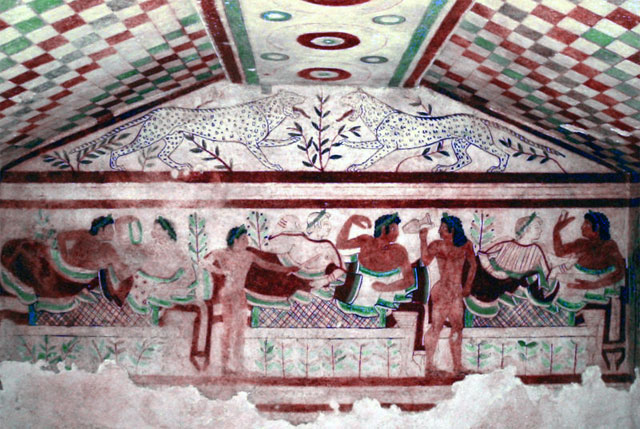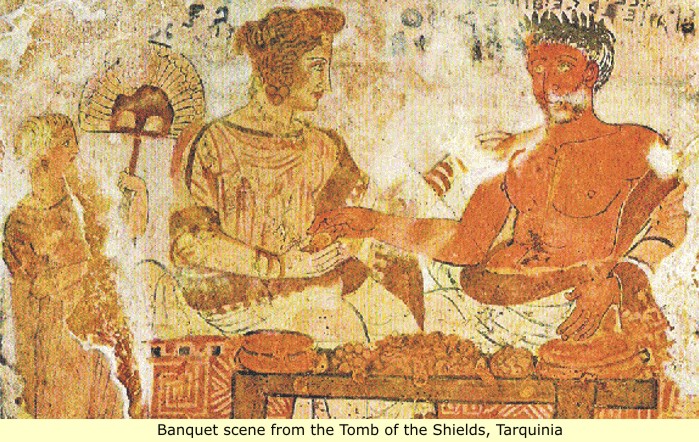Angela
Elite member
- Messages
- 21,823
- Reaction score
- 12,329
- Points
- 113
- Ethnic group
- Italian
ok I read it
I can not find transalations, but seems Greek archaiologists found etruscan religious remnants also in island of Tηνος Τinos before 800-700 BC
http://www.academia.edu/4681120/Χάρ...γίας-Ιστορικός_Η_ΑΡΧΑΙΑ_ΤΗΝΟΣ_ΣΤΟ_ΜΙΚΡΟΣΚΟΠΙΟ
also a Historian which even today no one dare to chalange him Thoukidides
The same winter the Megarians took and razed to the foundations the long walls which had been occupied by the Athenians; and Brasidas after the capture of Amphipolis marched with his allies against Acte, [2] a promontory running out from the king's dike with an inward curve, and ending in Athos, a lofty mountain looking towards the Aegean sea. [3] In it are various towns, Sane, an Andrian colony, close to the canal, and facing the sea in the direction of Euboea; the others being Thyssus, Cleone, Acrothoi, Olophyxus, [4] and Dium, inhabited by mixed barbarian races speaking the two languages. There is also a small Chalcidian element; but the greater number are Tyrrheno-Pelasgians once settled in Lemnos and Athens, and Bisaltians, Crestonians, and Edonians; the towns being all small ones. [5] Most of these came over to Brasidas; but Sane and Dium held out and saw their land ravaged by him and his army.
Well, the conclusion of Briquet, and my conclusion after reading the chapter again, is that none of what these ancient writers say should be taken as a "scientific inquiry about the identity of a people."
As Briquet shows quite compellingly, I think, these ancient writers were not historians in the modern sense of the world. They wove together the stories of their gods and ancient heroes and modern cultural and trade associations into one big mish mash, and, as is the case for some people nowadays as well, they often had an agenda to promote.
Dionysius, as has been seen, supported the autochthonous origin. However, given the tenor of his entire work, some scholars believe he supported this theory largely to denigrate the Etruscans by showing them [FONT="]not[/FONT] to be Greek or civilized, but rather the barbarian pirates of common Greek perception.
As to Herodotus' claim, I would suggest reading the whole chapter by Briquet; it's not very long. To recap it, it appears in a much longer exposition of who invented the games. In the course of it he says that the Lydians maintained that they invented the games at the same time that they sent some settlers to "Tyrrhenia". It doesn't seem they were necessarily correct about who invented the games, and, of course, the area around the northern Aegean was also called "Tyrrhenia" at one point. Meanwhile, the Etruscan/Tyrrenians called themselves Rasenna. You see how it goes?
Also, as has been pointed out, Lydians spoke an Indo-European language, and the Lydian historian of the 5th century BC, Xanthos, had, according to Dionysius, never heard of the story.
As for the "Pelasgian" theory of Hellicanus, among others, both the Greeks and the Etruscans promoted it, but from the explanation of Briquet, both the Greeks and the Etruscans, although sometimes rivals in trade, were also allies in trade, and it was in both their interests to support a theory whereby the Greeks and the Etruscans were somewhat related.
From the text:
"Etruscans were barbarians; this connected them with a people whom the Greeks represented as having been established on the soil of Hellas even before themselves and constituting the source of several Hellenic populations of later times (especially the Athenians presented by Herodotus 1.56 as the finest example of a Greek people descended from the Pelasgians.)...He well understood an aspect that would have been a positive in the eyes of the Greeks: being of Pelasgian origin, the Etruscans could be perceived, if not as Greeks in the strict sense (because they did not speak Greek) at least as related to a people with whom the Greeks were linked. In short, considered as ancient Pelasgians, the Etruscans were quasi-Hellenes."
This putative "Pelasgian" origin was also helpful to the Etruscans. "It is no coincidence either that around the time that Hellicanus developed the tradition of the Pelasgian origin of the Etruscans (firth century BC)... these two Etruscan cities (Spina and Caere) were centers of active trade with the Greek world. They presented themelves as founded by Pelasgians, highlighted their syngeneia" with this nearly Hellenic people, and conferred on themselves a prestigious foundation for the bonds of exchange and commercial partnership."
I'm quite aware that there are people who would interpret this claim by the Etruscans as meaning they must indeed descend from the "Pelasgians". The Etruscans are like a Rohrschack test; people see what they want to see.
In that regard it should be noted that the Pelasgian spoken, according to Herodotus, in Placia and Sylace near the Hellespont, and in Chalcidice , not in Cortona, as sometimes averred, is held by Dionysius not to resemble Etruscan at all. Well, at least it seems everyone is in agreement that Pelasgian was still spoken in some areas even at this late date.
Chalcidice is in Macedonia, by the way, so we are circling that area again...
http://en.wikipedia.org/wiki/Chalkidiki#/media/File:Nomos_Chalidikis.png
I'm rather persuaded by Briquet's conclusions about these stories: "Whether for the autochthonist thesis, or that identifying the Etruscans with the Pelasgians, or that they derived from Lydian colonists, their primary function was to account for the connections that existed at the time that these traditions were disseminated between the historical Etruscans and the Greeks. The meaning of a doctrine such as this, making the Etruscans natives, carried the corollary that they were mere Italian barbarians and were unrelated to Hellenism and its values: we recognize a development by hostile Greeks, probably the Syracusans at the time of their struggles against the Etruscans. The other two doctrines were rather favorable presentations: whether that of the Lydian origin...or that of the Pelasgian origin...With all of this we are far from scientific discourse."
I was particularly amused by the author's citation for a situation where, to facilitate trade, the Spartans asserted "brotherhood" with the Jews through their common origin from Abraham. Who knew?
That isn't to say that some historical memories might not have survived of an ancient population movement from the Aegean or other areas to the east into portions of Italy. We in fact know from archaeology that there was movement during the Bronze Age from Greece proper and Crete into Italy. The point is that we don't know if an additional migration happened specifically around 1000 BC to central Italy from either the northern Aegean or some other part of Anatolia, because the ancient writers contradict one another, and the stories are based on assertions that could be seen as agenda driven. I'm back to the beginning on this...[FONT="]if [/FONT]it happened, we don't know if it happened around 900 to 1000 BC, we don't know from where, and we don't know what they were like autsomally. Hopefully we'll know more soon.
What we do know, as the author points out, is that " we cannot reduce a people to a single origin to account for all they have been in history. Every people has been the result of a melting pot, formed by the superposition and mixing of diverse elements. Any attempt to explain it in terms of origin is historically simplistic and wrong."





